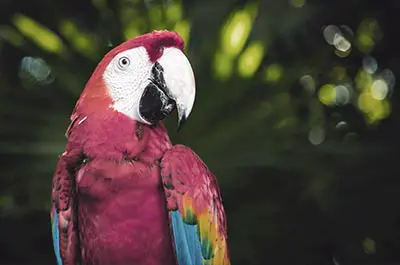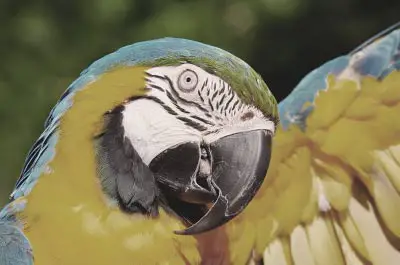If you’re thinking of adding a feathered friend to your family, a parrot is a great option. They are relatively easy to care for and can provide years of companionship. But before you bring one home, there are some things you need to know. We’ll share some tips on caring for a parrot and ensuring they have a long and healthy life in this post. Keep reading for more!
Stop Your Parrot From Biting, Train Tricks, Speech & More [ad]
Make sure you have enough space for your bird.

Parrots are large birds, so you’ll need to have plenty of room in your home for them.
Your birds should have ample room to spread their wings, fly around, and engage in regular flight exercises.
A macaw parrot needs about the same amount of space as a small dog, so if your house is on the small side, you might want to think twice. Of course, there are always exceptions and budgie parrots only need a small cage to be happy.
If you opt to keep your parrot caged at all times, make sure you get one that is large enough for them to feel comfortable. You may even consider purchasing two cages and alternating their locations to ensure your bird always has enough room.
Provide your parrot with plenty of affection.
Birds crave attention, so make sure you spend plenty of time cuddling with yours. While this is especially important for young birds, even older parrots need lots of affection to stay happy. If you own more than one bird, you should give them equal attention to avoid feeling neglected.
A parrot that isn’t given enough affection will begin acting out and getting into trouble. If your bird misbehaves, don’t hesitate to spend more time with them. In most cases, a little extra TLC will do the trick.
The main thing to remember is that to take good care of a bird; you must spend time with it daily. If you can’t keep your bird entertained and well-fed, you might want to find a new home where someone else will have the time for them. Happy parrots are healthy parrots!
Give your parrot new toys often.
Parrots are naturally curious animals who enjoy playing with new toys regularly. That’s why it’s essential to provide lots of new items for them to play with every once in a while. Just make sure they’re safe and age-appropriate before you let your bird near any toy for the first time.
Parrots are naturally playful animals that spend most o their time playing. Providing interesting new toys that are the right size will help keep your parrot physically fit. Not only that, but it’ll also help keep their mind active.
A bored parrot can get into trouble, so make sure you keep them entertained. One way to do that is to rotate their toys every month.
Give your parrot plenty of opportunities for socialization.

Birds are very social creatures who enjoy the company of other birds and humans alike. If you want your bird to be as happy as possible, it’s important to ensure they have many opportunities to spend time with others. Take them outside once a day and give them plenty of opportunities to interact with other people and pets.
You can also buy a second bird and let them play together (make sure they get along first). Or, if you own more than one bird, try interacting with them both simultaneously — just make sure not to neglect either one.
Give your parrot enough time outside of the cage.
While it’s important to keep your bird in its cage when you’re not around, you should still give it plenty of time outside of it. This is especially important if you keep your bird untrained; they will need plenty of opportunities to explore the house without getting into trouble.
While most parrots love being out of their cages, there are always exceptions. Even unfriendly birds can benefit from daily “cage-free” time, but if your parrot doesn’t like it at all, don’t force them to spend time that way. You can always try again later!
It’s also a good idea to let your bird sit on your finger outside of the cage, but only if you’re around to supervise them. They should be well-trained before you let them sit atop your hand unattended.
Provide nutritious food.
Parrots have unique nutritional needs, so you should give them a balanced diet specially formulated for their species. Some parrots can also eat fruit, vegetables, and other healthy treats throughout the day. If you want your birds to be happy and healthy, ensure they eat foods they enjoy.
Just remember that parrots aren’t big fans of bland, boring foods. If you feed your bird something they don’t like, they’ll probably starve themselves instead of eating it.
If you’re not sure whether or not your bird’s diet is balanced, ask your avian vet for help. They’ll know precisely what your pet needs to stay healthy.
It’s also important to make sure your bird is drinking a lot of water. If you see your parrot flying towards a source of running water, they probably want to drink. Make sure their water bowl is always full, and change it frequently to ensure it’s clean.
Provide regular veterinary care.
Like any other pet, it’s crucial to take your parrot to the vet for regular checkups. Your bird needs a clean bill of health before you let it fly outside without supervision. Birds can pick up all kinds of nasty diseases from other animals, so ensure they’re fully vaccinated before you let them get too close to other pets.
Your avian vet can also give your bird a full physical exam and let you know if they need any extra care. If your parrot is sick, there are plenty of avian medications that will make them feel better in no time.
Be sensitive to your bird’s fear of loud noises.
Unlike humans, some parrots are afraid of loud, sudden noises. If you own a susceptible bird, make sure that you keep them away from stereos, televisions, and other everyday household items that might scare them. Keep your curtains closed on days when there’s lots of extra noise outside, too (for instance, during sporting events).

Also, be aware of things like fireworks — they might not bother you at all, but they can easily frighten birds to death if they startle them too much.
Like dogs and cats, parrots are sensitive to their owner’s moods. If you’re stressed or angry, they’ll sense that change in your behavior (and become stressed or anxious themselves). This is especially important if your pet spends a lot of time out of its cage without you around.
Just remember that they don’t understand why you’re upset over a little thing like work or bills — all they know is that you suddenly stopped being fun! Your bird may try to “help” by chewing on things they shouldn’t, so it’s important not to punish them for this type of misbehavior. Instead, do what you want to comfort them and let them spend time with you until your mood improves again.
Ensure your parrot’s cage is always clean.
As your bird goes potty inside the cage, waste will accumulate at the bottom of it over time. This can lead to bacterial growth and other diseases if it isn’t cleaned regularly. Make sure you disinfect the cage entirely once every month or two, depending on how often your parrot uses it.
Also, be sure to change out all of their perches and toys during this time as well to prevent bacteria from spreading.
Make sure to clean up any messes your parrot makes outside the cage as well.
A dirty bird can become unhealthy and unhappy fast, so make sure you spend extra time cleaning its cage regularly.
Clean up after your pet immediately if they have an accident in the house, even if it’s just saliva on the floor.
Stop Your Parrot From Biting, Train Tricks, Speech & More [ad]
Make sure you trim your bird’s nails regularly.
It’s important to tame and trim your bird’s nails every once in a while so they don’t get too long for their feet. If you’re not comfortable with this process, consider having it done by an expert groomer at least once every couple of months or so.
Trimming your pet’s nails regularly keeps them healthy and makes walking easier. This also helps prevent injuries when they fly around outside of the cage. For more tips on caring for a parrot, contact an animal hospital like Southside Veterinary Center.
Conclusion.
I hope this article was helpful for you. These are all things that I have learned by having parrots for much of my life!
Owning a parrot is not for everyone, so make sure you know what you’re getting into right from the start!
Thank you for reading; if you like it, please share it with someone else who may be interested in owning a parrot.

Dive into the insights of Matthew Mansour, a seasoned life coach, fitness guru, and health mentor. With a portfolio boasting over 800 thought-provoking articles, Matthew is passionate about unraveling the intricate layers of the human psyche. His reading choices? Books that shed light on our unique human journey, helping him (and his readers) harness the power of the mind, transforming challenges into stepping stones.
Matthew proudly wears his badge as a self-help aficionado. His mantra? There’s always room to grow, learn, and be inspired. He thrives on gleaning wisdom from pioneers, turning their experiences into valuable lessons for all.
Always on the pulse of emerging trends, Matthew immerses himself in groundbreaking courses and research centered around life coaching and holistic health. Eager to impart his knowledge, he’s here to guide anyone keen on enhancing their life journey.
Beyond his professional persona, Matthew is a devoted animal lover, a proud New Jersey resident, and a doting husband and father. Dive into his self-improvement blog and let Matthew guide you towards a life filled with purpose and passion!
Reviewed By: Joanna Perez and Marcella Raskin
Edited By: Lenny Terra
Fact Checked By: Gabrielle J. Smith
Photos Taken or Curated By: Matthew Mansour